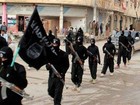Protesters from the “You Stink” movement sought on Monday to block several major roads that lead to Beirut, saying their move is aimed at rejecting the landfills that will be established by the state.
Police pushed dozens of protesters to the side of the highway in Dora and in another area in Hazmieh to stop them from blocking the roads during the early morning rush hour.
 Full Story
Full Story
The Free Patriotic Movement declared Sunday that a strong Lebanon requires “a strong president and a strong army,” as it warned against any attempt to elect a president through a non-consensual parliamentary quorum.
“Lebanon's strength lies in a strong president and a strong army … and a balanced foreign policy that achieves the country's interest,” FPM chief Jebran Bassil said, reciting clauses of the movement's new political manifesto.
 Full Story
Full Story
Following a cabinet decision to open three landfills to remove the accumulating trash in several Lebanese areas, residents and anti-trash campaigners held sit-ins Sunday in the Naameh and Choueifat areas and declared that they would block “Beirut's entrances” on Monday morning.
“We will escalate our protests tomorrow through blocking Beirut's entrances in the morning for several hours,” civil society protesters announced from the Riad al-Solh Square, where an open-ended sit-in has been underway since Saturday evening.
 Full Story
Full Story
A Lebanese citizen was killed and five others were injured Sunday when heavily-armed gunmen opened fire in the Ivory Coast resort town of Grand-Bassam in an attack that left at least 16 people dead.
“The attack was carried out by more than 13 militants, who arrived by sea at the targeted area and opened fire indiscriminately on the restaurants' customers, causing heavy casualties,” Lebanon's National News Agency said.
 Full Story
Full Story
The Syrian delegation traveled on Sunday from Beirut to Geneva where it is set to participate in the second round of the upcoming peace negotiations with the opposition under UN auspices, the state-run National News Agency reported.
“The Syrian delegation headed by Permanent Representative of Syria to the United Nations, Bashar Jaafari, traveled from Beirut to Geneva to participate in the meetings, which will start Monday,” NNA added.
 Full Story
Full Story
Foreign Minister Jebran Bassil stressed on Sunday that declaring Hizbullah as a terrorist group at the Arab League was “unacceptable,” pointing out that Lebanon has already expressed reservation on that labeling.
In an interview to the Kuwaiti al-Rai daily Bassil said: “Describing the party as terrorist does not comply with the Arab treaty to combat terrorism.”
 Full Story
Full Story
Syrian Foreign Minister Walid Muallem said on Saturday that the Arab League’s branding of Hizbullah as a terrorist group was “shameful” and “absurd.”
“The latest decision taken by the Arab League on Hizbullah is absurd,” said Muallem at a news conference he held in Damascus.
 Full Story
Full Story
Arab League foreign ministers on Friday declared Hizbullah a "terrorist" group, days after Arab interior ministers and the Gulf Cooperation Council issued similar resolutions.
Nearly all members of the pan-Arab body supported the decision, but not Lebanon and Iraq which expressed "reservations", the bloc said in a statement read out at a news conference by Bahraini diplomat Wahid Mubarak Sayar.
 Full Story
Full Story
Tens of thousands of documents that were leaked Wednesday containing the names, addresses, phone numbers and family contacts of Islamic State militants included the names of two Lebanese engineers who planned to carry out suicide attacks, LBCI reported on Friday.
Engineer graduates Abou Khattab al-Tamimi (1988) from the Bekaa area of Bouwerij and Abou Shadi al-Lebnani (1982) from the town of Qaraoun were listed among the names of 122 IS suicide attackers.
 Full Story
Full Story
Speaker Nabih Berri said on Friday that the stalled presidential elections are ready to be held at the current stage and assured that Saudi Arabia will not abandon Lebanon, An Nahar daily reported.
“The presidential fruit is mature and ripe for picking after all the delay,” he told the daily.
 Full Story
Full Story



